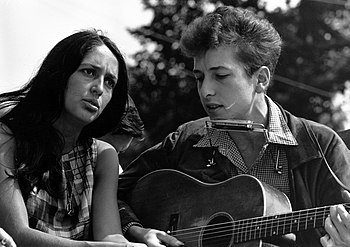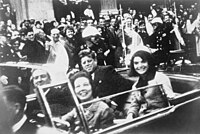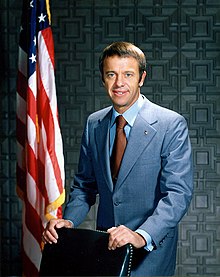Portal:1960s
The 1960s Portal
The 1960s became synonymous with the new, radical, and subversive events and trends of the period. In Africa the 1960s was a period of radical political change as 32 countries gained independence from their European colonial rulers. Some commentators have seen in this era a classical Jungian nightmare cycle, where a rigid culture, unable to contain the demands for greater individual freedom, broke free of the social constraints of the previous age through extreme deviation from the norm. Christopher Booker charts the rise, success, fall/nightmare and explosion in the London scene of the 1960s. However, this alone does not explain the mass nature of the phenomenon. Several nations such as the U.S., France, Germany and Britain turned to the left in the early and mid 1960s. In the United States, John F. Kennedy, a Keynesian and staunch anti-communist, pushed for social reforms. His assassination in 1963 was a stunning shock. Liberal reforms were finally passed under Lyndon B. Johnson including civil rights for African Americans and healthcare for the elderly and the poor. Despite his large-scale Great Society programs, Johnson was increasingly reviled by the New Left at home and abroad. The heavy-handed American role in the Vietnam War outraged student protestors across the globe, as they found peasant rebellion typified by Ho Chi Minh and Che Guevara more appealing. Italy formed its first left-of-center government in March 1962 with a coalition of Christian Democrats, Social Democrats, and moderate Republicans. Socialists joined the ruling block in December 1963. In Britain, the Labour Party gained power in 1964. In Brazil, João Goulart became president after Jânio Quadros resigned. This is a Featured article, which represents some of the best content on English Wikipedia..
The Voting Rights Act of 1965 is a landmark piece of federal legislation in the United States that prohibits racial discrimination in voting. It was signed into law by President Lyndon B. Johnson during the height of the civil rights movement on August 6, 1965, and Congress later amended the Act five times to expand its protections. Designed to enforce the voting rights protected by the Fourteenth and Fifteenth Amendments to the United States Constitution, the Act sought to secure the right to vote for racial minorities throughout the country, especially in the South. According to the U.S. Department of Justice, the Act is considered to be the most effective piece of federal civil rights legislation ever enacted in the country. The National Archives and Records Administration stated: "The Voting Rights Act of 1965 was the most significant statutory change in the relationship between the federal and state governments in the area of voting since the Reconstruction period following the Civil War". The act contains numerous provisions that regulate elections. The act's "general provisions" provide nationwide protections for voting rights. Section 2 is a general provision that prohibits state and local government from imposing any voting rule that "results in the denial or abridgement of the right of any citizen to vote on account of race or color" or membership in a language minority group. Other general provisions specifically outlaw literacy tests and similar devices that were historically used to disenfranchise racial minorities. The act also contains "special provisions" that apply to only certain jurisdictions. A core special provision is the Section 5 preclearance requirement, which prohibited certain jurisdictions from implementing any change affecting voting without first receiving confirmation from the U.S. attorney general or the U.S. District Court for D.C. that the change does not discriminate against protected minorities. Another special provision requires jurisdictions containing significant language minority populations to provide bilingual ballots and other election materials. (Full article...)This is a Good article, an article that meets a core set of high editorial standards.
In 1968 and 1969, student protests at several Japanese universities ultimately forced the closure of campuses across Japan. Known as daigaku funsō (大学紛争, lit. 'university troubles') or daigaku tōsō (大学闘争, 'university struggles'), the protests were part of the worldwide protest cycle in 1968 and the late-1960s Japanese protest cycle, including the Anpo protests of 1970 and the struggle against the construction of Narita Airport. Students demonstrated initially against practical issues in universities and eventually formed the Zenkyōtō in mid-1968 to organize themselves. The Act on Temporary Measures concerning University Management allowed for the dispersal of protesters in 1969. Initially, demonstrations were organized to protest against unpaid internships at the University of Tokyo Medical School. Building on years of student organization and protest, New Left student organizations began occupying buildings around campus. The other main campus where the protests originated was Nihon University. They began with student discontent over alleged corruption in the university board of directors. At Nihon, protests were driven less by ideology and more by pragmatism because of the university's traditional and conservative nature. The movement spread to other Japanese universities, escalating into violence both on campus and in the streets. In late 1968, at the zenith of the movement, thousands of students entered Tokyo's busiest railway station, Shinjuku and rioted. Factional infighting (uchi-geba, 内ゲバ) was rampant among these students. In January 1969, the police besieged the University of Tokyo and ended the protests there, leading to renewed fervor from students at other universities, where protests continued. However, as public support for the students fell, and the police increased their efforts to stop the protests, the movement waned. The passage of the 1969 Act on Temporary Measures concerning University Management gave police the legal basis to apply more forceful measures, although splinter groups of the New Left groups, such as the United Red Army, continued their violence into the 1970s. (Full article...)Selected picture - American folk singers Joan Baez and Bob Dylan, performing a duet at the March on Washington for Jobs and Freedom on August 28, 1963. Both were relatively new recording artists at the time, with Baez being at the forefront of American roots revival and Dylan having just released his second album. Baez was especially influential in introducing audiences to Dylan's music by recording several of his early songs and inviting him onstage during her own concerts.
Did you know -
Related portalsThis is a Featured article, which represents some of the best content on English Wikipedia..
Alan Bartlett Shepard Jr. (November 18, 1923 – July 21, 1998) was an American astronaut. In 1961, he became the second person and the first American to travel into space and, in 1971, he became the fifth and oldest person to walk on the Moon, at age 47. A graduate of the United States Naval Academy at Annapolis, Shepard saw action with the surface navy during World War II. He became a naval aviator in 1947, and a test pilot in 1950. He was selected as one of the original NASA Mercury Seven astronauts in 1959, and in May 1961 he made the first crewed Project Mercury flight, Mercury-Redstone 3, in a spacecraft he named Freedom 7. His craft entered space, but was not capable of achieving orbit. He became the second person, and the first American, to travel into space. In the final stages of Project Mercury, Shepard was scheduled to pilot the Mercury-Atlas 10 (MA-10), which was planned as a three-day mission. He named Mercury Spacecraft 15B Freedom 7 II in honor of his first spacecraft, but the mission was canceled. (Full article...)This is a Good article, an article that meets a core set of high editorial standards.
Ravi Shankar KBE (Bengali pronunciation: [ˈrobi ˈʃɔŋkor]; born Robindro Shaunkor Chowdhury, sometimes spelled as Rabindra Shankar Chowdhury; 7 April 1920 – 11 December 2012) was an Indian sitarist and composer. A sitar virtuoso, he became the world's best-known expert of North Indian classical music in the second half of the 20th century, and influenced many musicians in India and throughout the world. Shankar was awarded India's highest civilian honour, the Bharat Ratna, in 1999. Shankar was born to a Bengali family in India, and spent his youth as a dancer touring India and Europe with the dance group of his brother Uday Shankar. At age 18, he gave up dancing to pursue a career in music, studying the sitar for seven years under court musician Allauddin Khan. After finishing his studies in 1944, Shankar worked as a composer, creating the music for the Apu Trilogy by Satyajit Ray, and was music director of All India Radio, New Delhi, from 1949 to 1956. He was nominated for the Academy Award for Best Original Score for scoring the blockbuster Gandhi (1982). (Full article...)Selected article -The Civil Rights Act of 1964 (Pub. L. 88–352, 78 Stat. 241, enacted July 2, 1964) is a landmark civil rights and labor law in the United States that outlaws discrimination based on race, color, religion, sex, and national origin. It prohibits unequal application of voter registration requirements, racial segregation in schools and public accommodations, and employment discrimination. The act "remains one of the most significant legislative achievements in American history". Initially, powers given to enforce the act were weak, but these were supplemented during later years. Congress asserted its authority to legislate under several different parts of the United States Constitution, principally its enumerated power to regulate interstate commerce under the Commerce Clause of Article I, Section VIII, its duty to guarantee all citizens equal protection of the laws under the Fourteenth Amendment, and its duty to protect voting rights under the Fifteenth Amendment. (Full article...)More Did you know (auto generated)
TopicsCategoriesWikiProjects
Associated WikimediaThe following Wikimedia Foundation sister projects provide more on this subject:
Discover Wikipedia using portals |




























